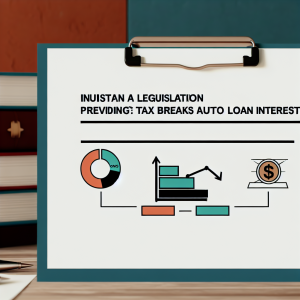Here’s an exclusive deep dive into the Senate GOP’s new auto loan interest tax break and why it matters — or doesn’t — for most American drivers. Spoiler: Not all drivers will benefit equally, and the devil is in the details.
The Senate’s Auto Loan Interest Deduction: What’s Really on the Table?
The Senate Finance Committee just rolled out a multitrillion-dollar tax package with a flashy headline: a tax deduction for auto loan interest. Drivers could deduct up to $10,000 of interest paid on auto loans from their taxable income between 2025 and 2028. Sounds like a win, right?
But here’s the catch — this deduction only applies to new cars assembled in the U.S. and excludes used vehicles, motorcycles aside. This is a significant departure from the House’s broader proposal, which included used cars, trailers, and campers. Tax experts like Matt Gardner from the Institute on Taxation and Economic Policy highlight the legislative language, noting it restricts eligibility to vehicles for which “the original use … commences with the taxpayer,” effectively meaning only new cars qualify.
Why This Matters: The Used Car Market and Income Disparities
According to a 2023 UCLA study, 61% of low- and middle-income households purchased used vehicles, while only 39% bought new ones. The average income for new car buyers is roughly $115,000, compared to $96,000 for used car buyers (Cox Automotive). With over 20 million households expected to buy used cars in 2025—far outpacing new car sales—this tax break largely excludes the majority of everyday buyers.
This exclusion disproportionately affects lower-income families who rely on used vehicles for affordability. So, while the deduction might sound like a boon, it’s primarily a perk for higher earners who can afford new cars—and who benefit more from deductions due to higher marginal tax rates.
The Tariff Factor: How Trump’s Trade Policies Undermine the Deduction
Adding complexity, the Trump administration’s 25% tariffs on imported cars and parts are pushing new car prices upward. This price hike diminishes the deduction’s value because higher car costs translate to higher loan amounts and interest, but the deduction phases out for incomes above $100,000 (or $200,000 for joint filers), reducing its benefit for many.
William McBride, chief economist at the Tax Foundation, points out the biggest shift from the House bill is the Senate’s move to exclude used car loans—likely a nod to budgetary constraints but a blow to affordability for many Americans.
What Should Investors and Advisors Do Now?
-
Reassess Auto Industry Investments: Investors should monitor how these tax policies impact new car sales. With tariffs inflating prices and tax benefits limited to new vehicles, demand could skew toward higher-income consumers, potentially benefiting luxury and domestic automakers more than used car dealers.
-
Advise Clients on Vehicle Financing Strategies: Financial advisors should counsel clients, especially middle- and lower-income households, that this deduction won’t help if they’re buying used cars. Instead, focus on negotiating better loan terms or exploring alternative transportation investments.
-
Watch for Legislative Tweaks: The tax bill is still in flux. Investors and advisors must stay alert for amendments that might expand or restrict this deduction further, especially as the bill moves closer to the president’s desk.
- Consider Broader Economic Impacts: Higher new car prices due to tariffs and limited tax relief could slow new car sales, pushing more buyers to used vehicles and potentially inflating the used car market. This could have ripple effects on credit markets and consumer spending patterns.
What’s Next?
Expect ongoing debates about balancing tax relief with budget cuts to health programs like Medicaid and the ACA, which fund part of this tax plan. Analysts from the Tax Policy Center and Tax Foundation suggest this auto loan interest deduction is a political compromise rather than a broad-based economic stimulus.
For investors, the key takeaway is that this tax break is a niche benefit with limited reach. The real story lies in how tariffs and income disparities shape the auto market over the next few years. Keep an eye on legislative updates and market responses to position portfolios and advice for the evolving landscape.
Unique Insight: A recent AAA report shows that average annual auto loan interest paid by new car buyers rose to $1,332 in 2024—a 7% increase from the previous year, partly driven by tariffs and supply chain issues. This trend suggests that even qualifying buyers might see diminishing returns from the deduction as loan costs climb.
By understanding these nuances, Extreme Investor Network readers can navigate the auto tax deduction landscape with clarity and strategic foresight—because in today’s complex policy environment, knowing the fine print is where real financial advantage lies.
Source: Senate GOP ‘big beautiful’ bill gives tax break on car loan interest

